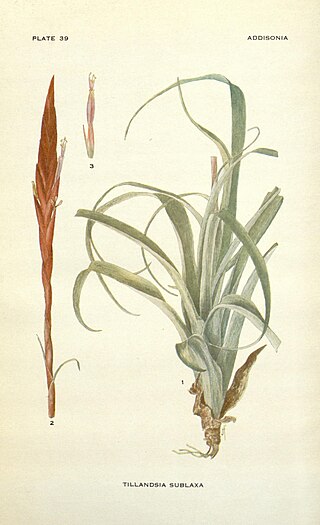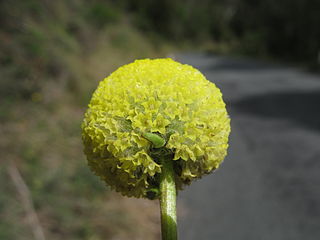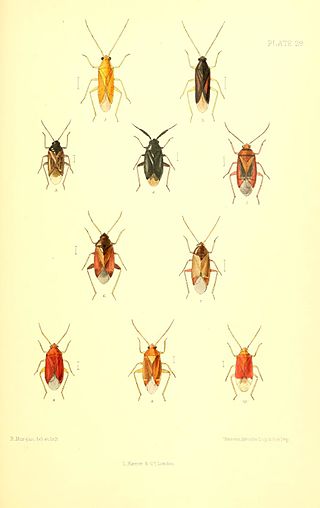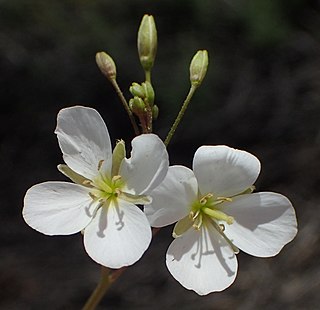
Dahlia is a genus of bushy, tuberous, herbaceous perennial plants native to Mexico and Central America. As a member of the Asteraceae family of dicotyledonous plants, its relatives include the sunflower, daisy, chrysanthemum, and zinnia. There are 49 species of dahlia, with flowers in almost every hue, with hybrids commonly grown as garden plants.

Quercus variabilis, the Chinese cork oak, is a species of oak in the section Quercus sect. Cerris, native to a wide area of eastern Asia in southern, central, and eastern China, Taiwan, Japan, and Korea.

Montia fontana, commonly known as blinks or water blinks, water chickweed or annual water miner's lettuce, is a herbaceous annual plant of the genus Montia. It is a common plant that can be found in wet environments around the globe, from the tropics to the Arctic. It is quite variable in morphology, taking a variety of forms. It is sometimes aquatic.

Austrostipa is a primarily Australian genus of plants in the grass family, commonly called speargrass.
Atriplex vesicaria subsp. variabilis is subspecies of bladder saltbush endemic to Australia.
Austrostipa variabilis is a species of grass in the family Poaceae that grows in southern parts of Australia.

Myrsine variabilis, synonym Rapanea variabilis, known as the muttonwood or variable muttonwood is a tree of eastern Australia. The range of natural distribution is from near Milton in southern New South Wales to the McIlwraith Range in far north Queensland.

Tillandsia variabilis, the leatherleaf airplant, is a species of bromeliad in the genus Tillandsia. This species is native to Bolivia, Costa Rica, Mexico, Venezuela, Colombia, the West Indies and southern Florida.
T. variabilis may refer to:
D. variabilis may refer to:

Ranitomeya variabilis, formerly known as Dendrodates variabilis, is a species of small poison dart frog distributed in northern Peru, along the eastern slope of Andes in the upper Rio Huallaga drainage basin. Its common name, Zimmerman's poison frog, is named after Elke Zimmermann, a German zoologist who described the morph of this species and differentiated it from D. ventrimaculatus. The species was formerly considered to be synonymous with Ranitomeya ventrimaculata.

Cape Flats Sand Fynbos (CFSF), previously known as Sand Plain Fynbos, is a critically endangered vegetation type that occurs only within the city of Cape Town. Less than 1% of this unique lowland fynbos vegetation is conserved.
Anabaena variabilis is a species of filamentous cyanobacterium. This species of the genus Anabaena and the domain Eubacteria is capable of photosynthesis. This species is heterotrophic, meaning that it may grow without light in the presence of fructose. It also can convert atmospheric dinitrogen to ammonia via nitrogen fixation.

Eragrostis variabilis is a species of grass known by the common names variable lovegrass, kawelu, emoloa, and kalamalo. It is endemic to Hawaii, where it occurs on all the main islands plus Kure Atoll, Midway Atoll, Pearl and Hermes Atoll, Lisianski Island, Laysan, and Nihoa.

Apophysomyces variabilis is an emerging fungal pathogen that can cause serious and sometimes fatal infection in humans. This fungus is a soil-dwelling saprobe with tropical to subtropical distribution. It is a zygomycete that causes mucormycosis, an infection in humans brought about by fungi in the order Mucorales. Infectious cases have been reported globally in locations including the Americas, Southeast Asia, India, and Australia. Apophysomyces variabilis infections are not transmissible from person to person.

Craspedia variabilis, commonly known as billy buttons, is an erect annual or perennial herb which occurs in all mainland states of Australia except for the Northern Territory and in a wide range of habitats in temperate zones but not in alpine areas.
Elaeocarpus taprobanicus is a species of flowering plant in the Elaeocarpaceae family used as a medicinal plant. It is one of three recently described species that is endemic to Sri Lanka.

Psallus variabilis is a species of plant bug in the family Miridae. It is found in the Palearctic and as an adventive species in North America. It feeds on the sap of a variety of forest trees including Quercus, plum and crab apple trees and on rose, raspberry and cranberry.

Heliophila variabilis is a species of flowering plant in the genus Heliophila.
Barlerieae is a tribe of flowering plants in the family Acanthaceae.












